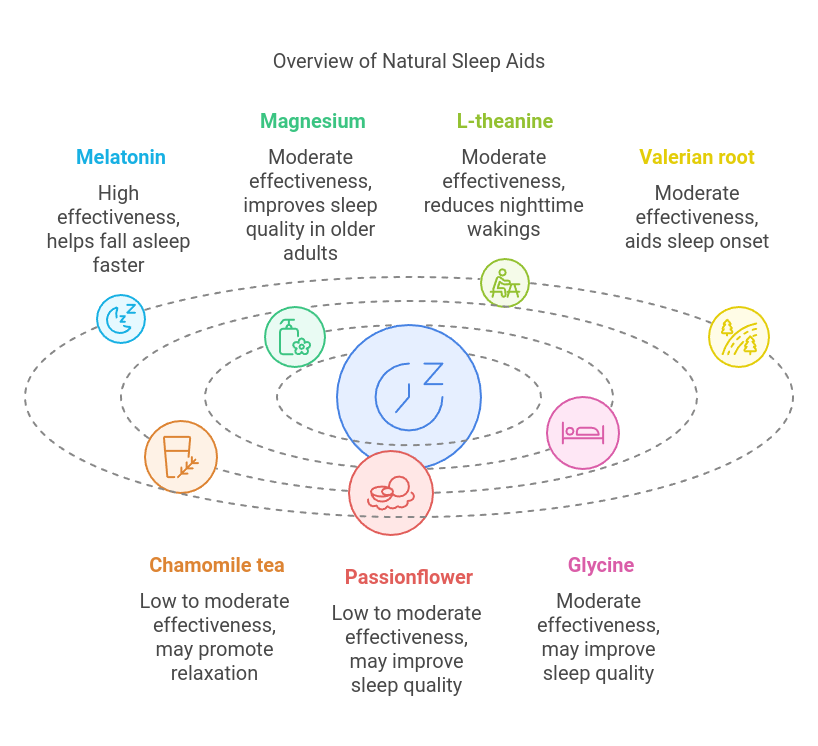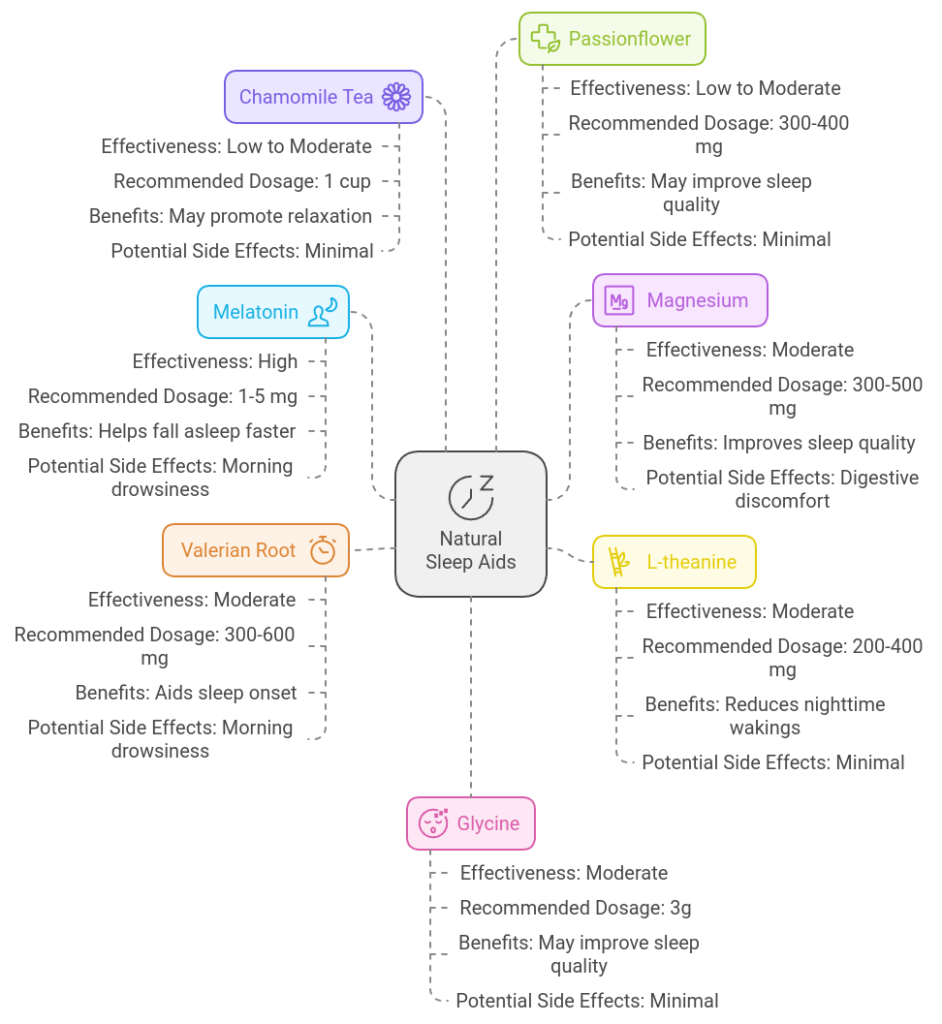Natural Sleep Aids: A Comprehensive Guide to Better Sleep
Are you tossing and turning at night, struggling to get the rest you need? Natural sleep aids might be the solution you’re looking for. These supplements and remedies can help promote better sleep without the strong side effects often associated with prescription medications.
Key Takeaways
- Melatonin is one of the most effective natural sleep aids
- Magnesium can improve sleep quality, especially for older adults
- Herbal remedies like valerian root and chamomile tea may help with relaxation
- Safety is important – consult a healthcare provider before using any sleep aid
- Combining natural sleep aids with good sleep hygiene practices yields the best results
What are Natural Sleep Aids and How Can They Help You Sleep?
Natural sleep aids are supplements and remedies that help you fall asleep and stay asleep without the harsh side effects often linked to prescription sleep medications. These aids work in various ways, from regulating your body’s sleep-wake cycle to promoting relaxation and reducing anxiety.
But do they really work? Let’s dive into the most effective natural sleep aids and how they can improve your sleep quality.
Most Effective Natural Sleep Aids

Melatonin for Insomnia and Sleep Regulation
Melatonin is a hormone naturally produced by your body that regulates your sleep-wake cycle. As a supplement, it’s one of the most studied and effective natural sleep aids available.
- Effectiveness: High
- Recommended Dosage: 1-5 mg before bedtime
- Benefits: Helps you fall asleep faster
- Potential Side Effects: Morning drowsiness
Research suggests that melatonin supplements can help people fall asleep faster and improve overall sleep quality. It’s particularly useful for those with jet lag or shift work sleep disorder.
Magnesium: Enhancing Sleep Quality and Restlessness
Magnesium is a mineral that plays a crucial role in many bodily functions, including sleep regulation.
- Effectiveness: Moderate
- Recommended Dosage: 300-500 mg daily
- Benefits: Improves sleep quality, especially in older adults
- Potential Side Effects: Digestive discomfort
Studies show that magnesium supplements may improve sleep quality, particularly in older adults and those with restless legs syndrome. Combining magnesium with other natural aids like melatonin may provide enhanced benefits.
L-Theanine: Promoting Relaxation and Reducing Nighttime Wakings
L-theanine is an amino acid found naturally in tea leaves, known for its calming effects.
- Effectiveness: Moderate
- Recommended Dosage: 200-400 mg before bed
- Benefits: Reduces nighttime wakings, promotes relaxation
- Potential Side Effects: Minimal
L-theanine can enhance sleep quality by reducing nighttime wakings and promoting relaxation. Daily supplements containing up to 200 mg may be beneficial for improving sleep.
Glycine: Improving Sleep Quality and Daytime Alertness
Glycine is an amino acid that may help improve sleep quality and reduce daytime sleepiness.
- Effectiveness: Moderate
- Recommended Dosage: 3g before bed
- Benefits: May improve sleep quality and reduce daytime sleepiness
- Potential Side Effects: Minimal
Taking 3 g of glycine before bed may improve sleep quality and reduce daytime sleepiness in people with insomnia symptoms. Up to 30 grams daily appears to have few side effects, though benefits are often achieved at lower doses.
Herbal Remedies and Other Natural Sleep Solutions
Valerian Root: A Traditional Remedy for Sleep Onset
Valerian root has been used for centuries as a natural sleep aid.
- Effectiveness: Moderate
- Recommended Dosage: 300-600 mg before bedtime
- Benefits: Aids sleep onset
- Potential Side Effects: Morning drowsiness, irregular heartbeat, dizziness, upset stomach, headaches
Valerian root can help with sleep onset when taken 30-60 minutes before bedtime. However, it’s important to note that rare cases of liver damage have been documented.
Chamomile Tea: A Calming Beverage for Relaxation
Chamomile tea is a popular herbal remedy known for its calming properties.
- Effectiveness: Low to Moderate
- Recommended Dosage: 1 cup before bed
- Benefits: May promote relaxation
- Potential Side Effects: Minimal
While widely used, clinical evidence for chamomile tea’s effectiveness as a sleep aid is limited. However, many people find it helps them relax before bedtime.
Passionflower: Potential Benefits for Subjective Sleep Quality
Passionflower is an herb that may help improve subjective sleep quality.
- Effectiveness: Low to Moderate
- Recommended Dosage: 300-400 mg before bed
- Benefits: May improve subjective sleep quality
- Potential Side Effects: Minimal
Some studies show significant improvements in certain sleep parameters when passionflower extract is taken over a 2-week period compared to a placebo.
Lavender: The Soothing Power of Aromatherapy for Sleep
Lavender is known for its calming scent and potential sleep-promoting effects.
- Effectiveness: Moderate
- Usage: Aromatherapy or essential oil
- Benefits: May enhance sleep quality
- Potential Side Effects: Minimal
Studies suggest that simply smelling lavender oil shortly before sleep can improve sleep in those with or without insomnia.
CBD Oil: Reducing Anxiety and Promoting Restful Sleep
CBD oil, derived from the cannabis plant, has gained popularity as a natural sleep aid.
- Effectiveness: Moderate
- Recommended Dosage: 25-175 mg daily
- Benefits: May reduce anxiety and promote sleep
- Potential Side Effects: Drowsiness, changes in appetite
CBD oil may help alleviate anxiety and act as a natural sleep aid. However, more research is needed to determine optimal dosages and long-term effects.
Kava: A Traditional Sleep Aid from the South Pacific
Kava is a plant native to the South Pacific islands, traditionally used as a relaxant.
- Effectiveness: Low to Moderate
- Usage: Typically prepared as a tea
- Benefits: May have sleep-promoting effects
- Potential Side Effects: Liver damage (in rare cases)
Some studies have linked kava to sleep-promoting effects, but more research is needed to confirm its efficacy and safety.
GABA: Boosting Relaxation and Sleep
GABA (Gamma-Aminobutyric Acid) is a neurotransmitter that plays a role in relaxation and sleep.
- Effectiveness: Low to Moderate
- Usage: Supplement form
- Benefits: May boost relaxation and help with sleep
- Potential Side Effects: Minimal
While not as well-studied as other natural sleep aids, GABA is believed to boost relaxation and potentially help with sleep when consumed in supplement form.
Safety and Regulation of Natural Sleep Aids
It’s important to understand that natural sleep aids are classified as dietary supplements and not strictly regulated by the FDA. While generally considered safer than prescription medications, they can still have side effects and interactions.
Always consult with a healthcare provider before starting any new supplement regimen, especially if you have underlying medical conditions or are taking medications.
Effectiveness, Usage, and Potential Side Effects

How Quickly Do Natural Sleep Aids Work?
The effectiveness of natural sleep aids can vary by individual and type of aid. Most should be taken 30-60 minutes before bedtime to allow time for the body to process them.
Who Should Avoid Natural Sleep Aids?
People with certain medical conditions, pregnant or nursing women, and those taking medications should consult their healthcare provider before using any natural sleep aids.
Potential Side Effects and Interactions
While natural sleep aids generally have fewer side effects than prescription medications, they can still cause issues such as:
- Morning drowsiness (particularly with valerian)
- Digestive discomfort
- Possible interactions with medications
Recommended Dosages and Usage Guidelines
Always start with the lowest effective dose and follow the recommended guidelines for each specific sleep aid. Here’s a quick reference table:
| Natural Sleep Aid | Recommended Dosage |
|---|---|
| Melatonin | 1-5 mg before bedtime |
| Magnesium | 300-500 mg daily |
| L-theanine | 200-400 mg before bed |
| Valerian root | 300-600 mg before bedtime |
| Chamomile tea | 1 cup before bed |
| Passionflower | 300-400 mg before bed |
| Glycine | 3g before bed |
Best Practices for Using Natural Sleep Aids
Start with the Lowest Effective Dose
Always begin with the lowest recommended dose and gradually increase if needed. This approach helps minimize potential side effects and allows you to find the optimal dosage for your needs.
Choose Reputable Manufacturers
When selecting natural sleep aids, opt for products from reputable manufacturers. Look for third-party testing and quality certifications to ensure you’re getting a safe and effective product.
Address Underlying Sleep Issues
Before relying on any sleep aid, it’s essential to address underlying sleep issues. This may include improving your sleep environment, establishing a consistent sleep schedule, and managing stress.
Combine with Good Sleep Hygiene Practices
For the best results, combine natural sleep aids with good sleep hygiene practices. This includes:
- Maintaining a consistent sleep schedule
- Creating a relaxing bedtime routine
- Limiting screen time before bed
- Keeping your bedroom cool, dark, and quiet
Frequently Asked Questions about Natural Sleep Aids
Are Natural Sleep Aids Habit-Forming?
Natural sleep aids typically have a low risk of dependency compared to prescription medications. However, it’s still important to use them as directed and not rely on them long-term without addressing underlying sleep issues.
How Long Does it Take for Natural Sleep Aids to Work?
The time it takes for natural sleep aids to work can vary. Some, like melatonin, may work within 30 minutes, while others, like magnesium, may take longer to show noticeable effects. Consistency is key when using natural sleep aids.
Who Should Consult a Healthcare Professional Before Using Natural Sleep Aids?
Anyone with underlying health conditions, pregnant or nursing women, and those taking medications should consult a healthcare professional before using natural sleep aids. It’s always better to err on the side of caution when it comes to your health and sleep.
Bottom Line
Natural sleep aids can be effective tools for improving sleep quality and addressing insomnia. From melatonin to herbal remedies, there are various options to explore. Remember to start with low doses, choose reputable products, and combine these aids with good sleep hygiene for the best results. Sweet dreams! 😴💤



